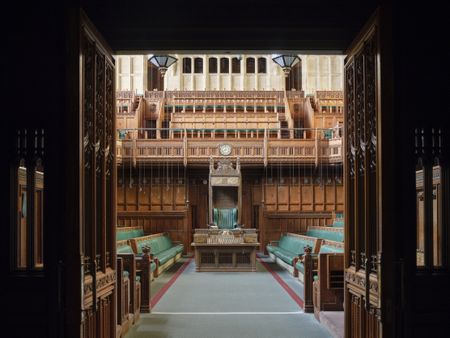-

Four wildly-different Georgian homes which sum up the appeal of the golden age of property architecture
By Julie Harding -
-

'Do not be afraid of looking like a tweed factory has thrown up on you': A snob’s guide to what to wear for Cheltenham
By Sophia Money-Coutts -

From Claudia Winkleman to the komondor, here are the 10 things to look out for at Crufts 2026
By Agnes Stamp -

A right royal affair with the stars
By Matthew Dennison -

Where has the biggest population — Sweden or Switzerland? Find out in the Country Life Quiz of the Day, March 3, 2026
By Country Life -

These are a few of James Middleton's favourite things
By Amie Elizabeth White -

Thomas Gainsborough means one thing in Britain. He means another in America
By Owen Holmes
-
Sign up for the Country Life Newsletter
Exquisite houses, the beauty of Nature, and how to get the most from your life, straight to your inbox.
People & Places
-
-

The life of a BAFTA begins in an industrial estate in Braintree
-

The W1 set is up in arms about Liz Truss's roof terrace. But what is a members' club without one?
-

What have the Romans ever done for us? For one thing, taught us the art of seduction
-

‘I’m like: “Give me those tights, let me show you”: Ballet superstar Carlos Acosta’s consuming passions
-
Property
View all Property-

Four wildly-different Georgian homes which sum up the appeal of the golden age of property architecture
By Julie Harding -
-

A Georgian home with a Laurence Llewelyn-Bowen living room that brings a touch of Hogwarts to one of the greenest parts of London
By Toby Keel -

A Somerset country home that unites the best of medieval, Georgian and Victorian under one roof
By Toby Keel -

Five magical country homes for sale across Britain, as seen in Country Life
By Toby Keel -

A spectacular home with a touch of Downton Abbey about it, standing beside one of the last remaining Saxon churches in Britain
By Toby Keel -

A Caribbean home with its own nightclub, down the road from a perfect beach and a pre-Columbian castle
By Toby Keel -

Alan Carr's new castle is 'a masterpiece of the baronial revival' with 17 bedrooms and its own miniature railway
By Toby Keel
-
Architecture
View all Architecture-

Gibside: The curious roofless castle where The King's ancestor was kidnapped
By Melanie Bryan -
-

'A blue-blood background and a drive to disrupt': Lady Violet Manners on the importance of preserving Britain's privately-owned country homes
By Owen Holmes -

A Suffolk home where glass, steel, timber and thatch come together in perfect harmony
By Clive Aslet -

Why has everyone fallen under the spell of Wrotham Park — one of the largest private houses inside the M25
By Laura Kay -

Refurbishing the Palace of Westminster will be extremely expensive, but so too will be doing nothing
By Athena -

What binds the Queen Mother and Chicago's first department store? A lost Scottish castle that was blown to smithereens by the Territorial Army
By Melanie Bryan -

The only thing better than a stately home is a stately home in wooden miniature
By Will Hosie -

'I have never ceased talking of the beauty of Ampthill': The tale of one of Britain's best-loved country houses
By Jeremy Musson
-
Our expert voices
Interiors
View All Interiors-

New designs and accessories to brighten every room
By Amelia Thorpe -
-

London Design Week: What to look out for at next month's unmissable interiors event
By Amelia Thorpe -

How do you add historic character back into a soulless room?
By Arabella Youens -

This clever interiors trick is the secret to creating multifunctional spaces — and it was integral to the design of many English country houses of the past
By Giles Kime -

'It was a complete wreck': Reclaiming a Hampshire coaching house from the earth
By Arabella Youens -

How do you add a dash of theatricality to a 1930s house? By taking inspiration from the legendary architect and set designer Oliver Messel
By Arabella Youens -

Are you a curator, a sympathiser or a conscientious objector? Take our Interiors Editor's quiz to discover your design DNA
By Giles Kime -

‘The pair drove to Belgium in their Mini and returned with the chair wrapped in duvets’: The mother-and-daughter duo that brought a converted Cotswolds barn back to life
By Arabella Youens
-
Gardens
View All Gardens-

'It was the only design that spoke the same language as the house. It immediately felt right': An Oxfordshire home where house and garden work in perfect, asymmetrical harmony
By Tiffany Daneff -
-

You don’t need to live in the countryside or have acres of space to start a cutting garden
By Amy Merrick -

Intrepid, enterprising, dedicated: The new generation of nursery owners creating the flowers we'll be enjoying for decades to come
By John Hoyland -

Alan Titchmarsh: Patience is in short supply today, but learning when to crack on and when to leave well alone will do your garden wonders
By Alan Titchmarsh -

Penns in the Rocks: The East Sussex garden created by Vita Sackville-West, with a little help from the huge boulders that stood here when dinosaurs walked the earth
By George Plumptre -

'I was utterly bewitched': The heartwarming success story of one of Britain's greatest rose-growers
By Charles Quest-Ritson
-
LIFE & STYLE
View All LIFE & STYLE-
-

'Do not be afraid of looking like a tweed factory has thrown up on you': A snob’s guide to what to wear for Cheltenham
By Sophia Money-Coutts -

From Claudia Winkleman to the komondor, here are the 10 things to look out for at Crufts 2026
By Agnes Stamp -

Driving is an occasion. It's time to dress like it
By Simon De Burton -

Almanza Backseat Driver, Collooney Tartan Tease, Burneze Geordie Girl: What it takes to be crowned Best in Show at Crufts (apart from a very long name)
By Florence Allen
-
THE COUNTRYSIDE
View All THE COUNTRYSIDE-
-

What is everyone talking about this week: Longevity? I think farmers invented that...
By Will Hosie -

Nature’s symbiotic relationships are as multifarious as they are marvellous
By John Lewis-Stempel -

The winter Olympians of the natural world
By Rosie Paterson
-
ART & CULTURE
View all ART & CULTURE-
-

A right royal affair with the stars
By Matthew Dennison -

Thomas Gainsborough means one thing in Britain. He means another in America
By Owen Holmes -

Sir Antony Gormley: Why I am continually captivated by Adriaen de Vries’s radical sculpture Antiope and Theseus
By Sir Antony Gormley -

'He was a French artist enamoured with light and colour, movement and lightness'
By James Fisher
-
Travel
View All Travel-

There are more than 100 species of lemur living on the world's fourth-largest island — and they cannot be found anywhere else on Earth
By Rupert Uloth -
-

In the battle of travel tour operator versus AI, who will win?
By Rosie Paterson -

Hôtel du Couvent: This former convent on the French Riviera has rekindled the rules of luxury
By James Fisher -

This Hollywood star's home in the Canadian wilderness is now an exclusive-use lodge
By Rosie Paterson -

The real challenge facing Britain's grande dame seafront hotels
By Athena -

Couples are changing how they holiday — even on honeymoon
By Rosie Paterson
-
Food & Drink
View All Food & Drink-

A very brief history of brown sauce
By Harry Pearson -
-

Forget museums, the pub is where real history happens
By Ashleigh Arnott -

It's alive! The UK producers embracing fermentation to make delicious products teeming with life
By Tom Howells -

‘French pastries all look amazing… but I wish more British bakers would look at what we used to have’: Richard Hart on the joys of jammy dodgers and iced buns
By Oliver Berry -

Where's the rum gone? How the temperance movement took on the Royal Navy
By Henry Jeffreys -

Tom Parker Bowles: 'There is no dish more lusty and full blooded than boeuf à la Bourguignonne'
By Tom Parker Bowles -

The 'chef's table' is off the ick list
By Emma Hughes
-







